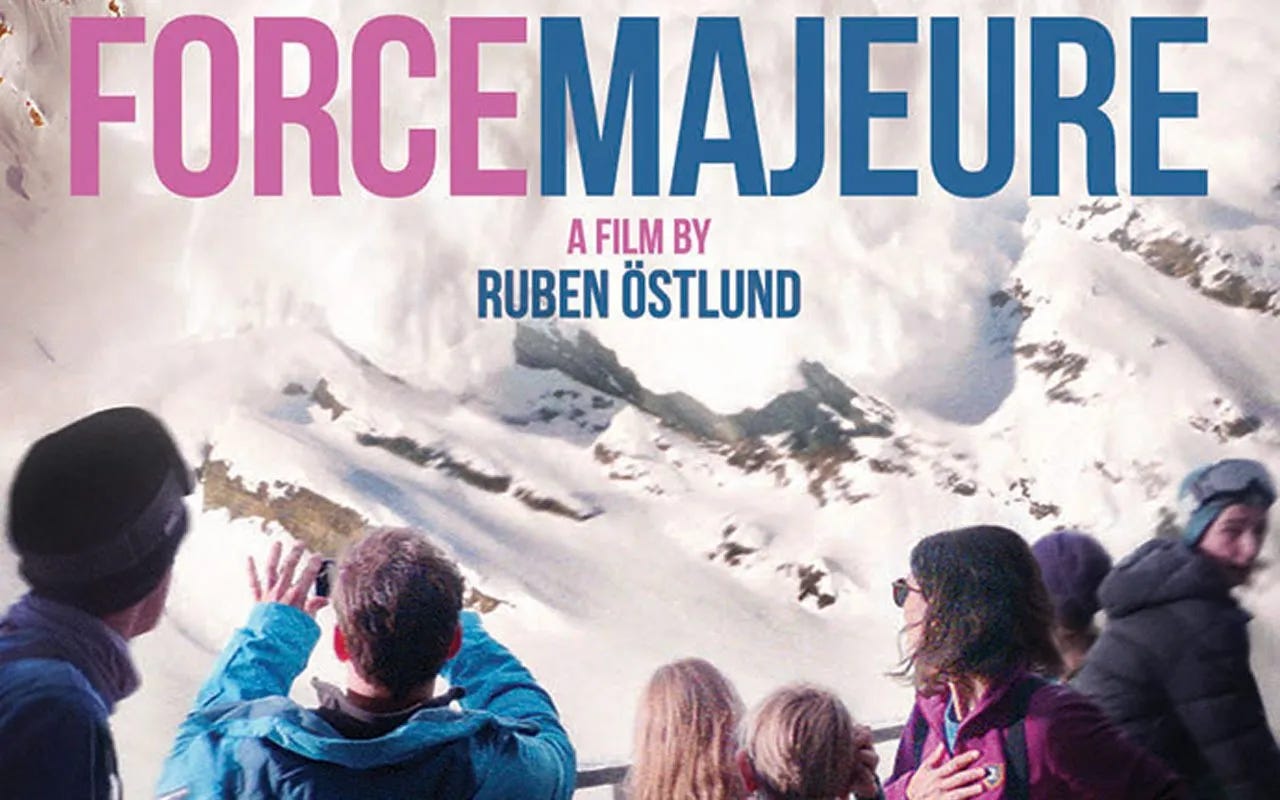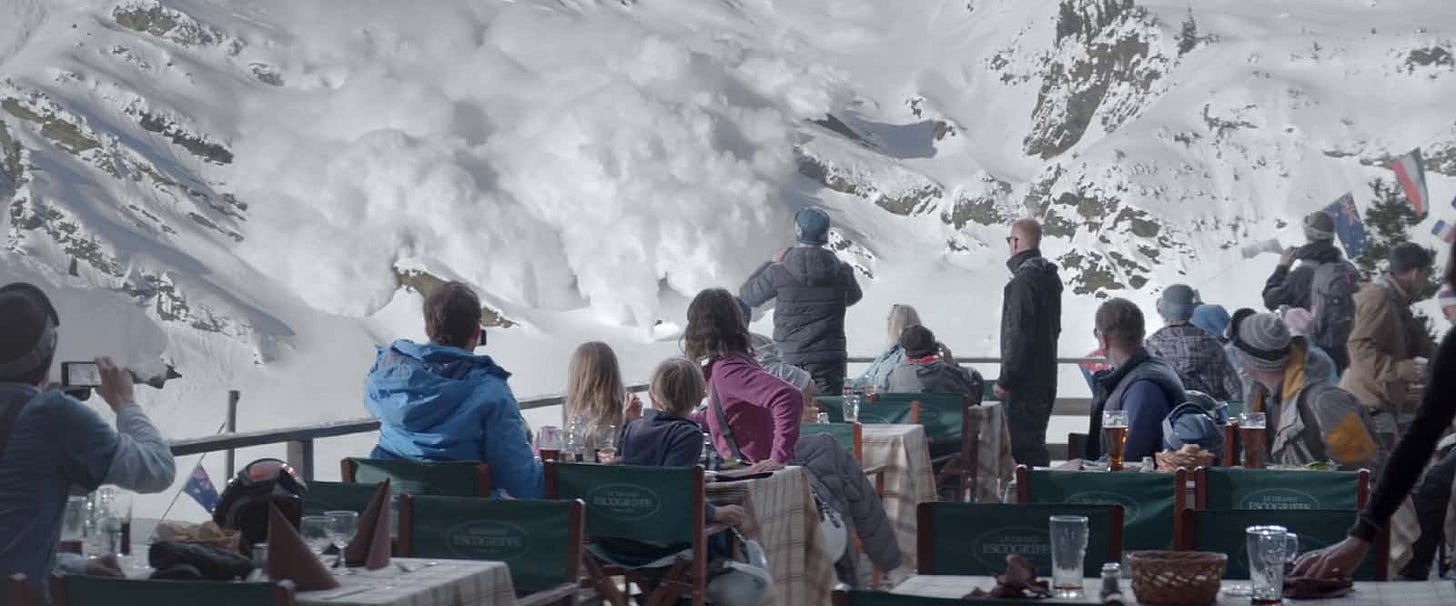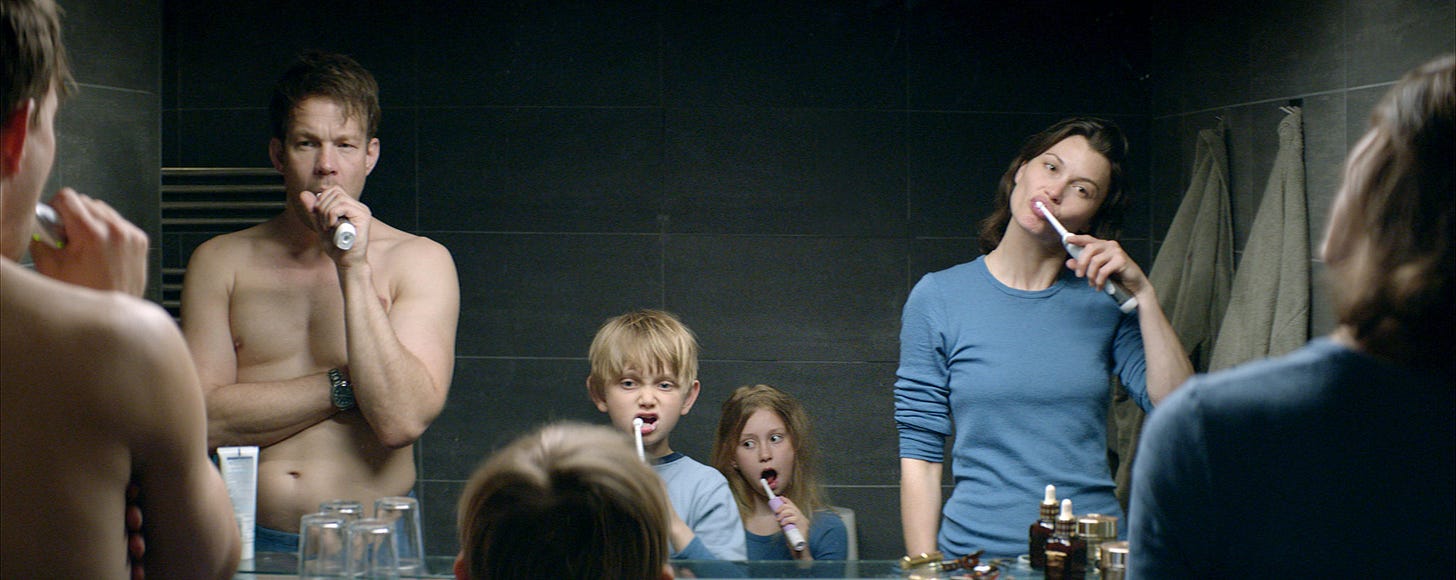Directed by Ruben Östlund
Sweden, 2014
Force majeure: a provision in a contract that excuses both parties from their obligations due to an ‘act of God’.
Ruben Östlund, the writer-director of this week’s film started out in his career by shooting skiing videos in the Alps. In Force Majeure, he brings both his technical expertise with the camera and his keen eye for social behaviour to bear in this highly polished, glacial comedy of manners.
The standard formula for a disaster movie is that we are introduced to a bunch of characters – some we like, some we don’t – and we watch their arcs develop over the course of the narrative. We finish with the catastrophe in the final act and hopefully the ones you were cheering for will survive. Östlund tears up this blueprint by giving us a family from an Alpen advert – none of whom, to be frank, is especially likeable – and throwing them into the disaster, in this case an avalanche, just ten minutes into the film. This, however, turns out to be a sleight of hand: the avalanche is harmless, and the real disaster is the earthquake that hits Tomas and Ebba’s relationship as their marriage collapses before us in slow motion.
The Swedish couple, with their two spoiled children, are enjoying their lunch at a high-end ski resort on a mountain-top in the French Alps. Tomas, a successful businessman, has been hauled away from work to grant his family some quality time. The booms of an explosion echo across the valley – it’s a controlled avalanche to make the ski slopes safe. “Don’t worry, they’ve got it under control”, says Tomas confidently as a wall of snow approaches. But as the screen whites out, we hear screams and cries of panic. Ebba grabs the children, her first thought is to protect them. Tomas grabs his gloves, his iPhone, and makes a dash for it.
As the mist clears, it turns out that this was just ‘avalanche smoke’, and that there was no real danger. Everyone returns to their seats and one of the kids asks: “Where is Dad?” Tomas returns, and acts as if nothing untoward has happened. No more is said, but the tension is palpable.
What follows is a closely observed dissection of Tomas and Ebba’s relationship, and in particular gender relations, as the ersatz nature of Tomas’ role as the family’s provider and protector is exposed. We witness a series of soul-baring dinner conversations with friends of the couple. They are asked to judge the accusations and self-justifications that follow as Tomas at first denies what happened, until the event is replayed for all to see … it was captured on his own camera. These scenes are morbidly comic, all the more so as they are played with a compelling intensity by Lisa Loven Kongsli as Ebba, and Johannes Kuhnke as Tomas.
The cinematography creates an Alpine landscape with a sheen that speaks of menace rather than beauty. This is heightened by the repeated motif of a frenzied riff from, ironically, the Summer concerto of Vivaldi’s Four Seasons. At one point, a toy drone flares across the sky resembling a UFO, evoking an otherworldly atmosphere. Yet how this relates to the film’s themes is less clear.
Östlund’s camera is locked in position for most of the film which creates a claustrophobic, imprisoning effect for the viewer. This works to brilliant effect in the avalanche sequence. The camera remains still throughout when Tomas abandons his family. We have no idea where he has run to, or whether he will return. This way of framing a shot can also make voyeurs of us, just like the hotel cleaner who, from the floor above, silently watches Tomas at the apex of his emotional breakdown.
You are not the only victim here… I’m a victim too. Victim of my own bloody instincts!
It is from this point that Östlund seems to tip his hand. Though he began the film by showing, he ends it by telling.
There is a contrived double ending where the gender balance is at first corrected, and then shifted in Tomas’ favour. The film ends with the family, walking down the mountain road with a group of tourists following yet another near disaster, this time involving an incompetent coach driver. A man offers Tomas a cigarette. After initially declining he takes it. His son, who is holding his hand, asks: “Do you smoke Daddy?” Tomas grins and responds, “Yes, I do”. It looks like Daddy is back.
We are a world away from the unsettling bathroom scenes earlier in the film where Thomas and Ebba stand side-by-side reflected in the mirror, brushing their teeth with electric toothbrushes – fighting a metaphorical duel. Force Majeure is certainly an entertaining work, but I can’t help but wonder how this story would have turned out in the hands of the director Michael Haneke.
Reids’ Results (out of 100)
C - 63
T - 73
N - 70
S - 69
Thank you for reading Reids on Film. If you enjoyed our review please share with a friend and do leave a comment.
Coming next… Hard to be a God(2013)







